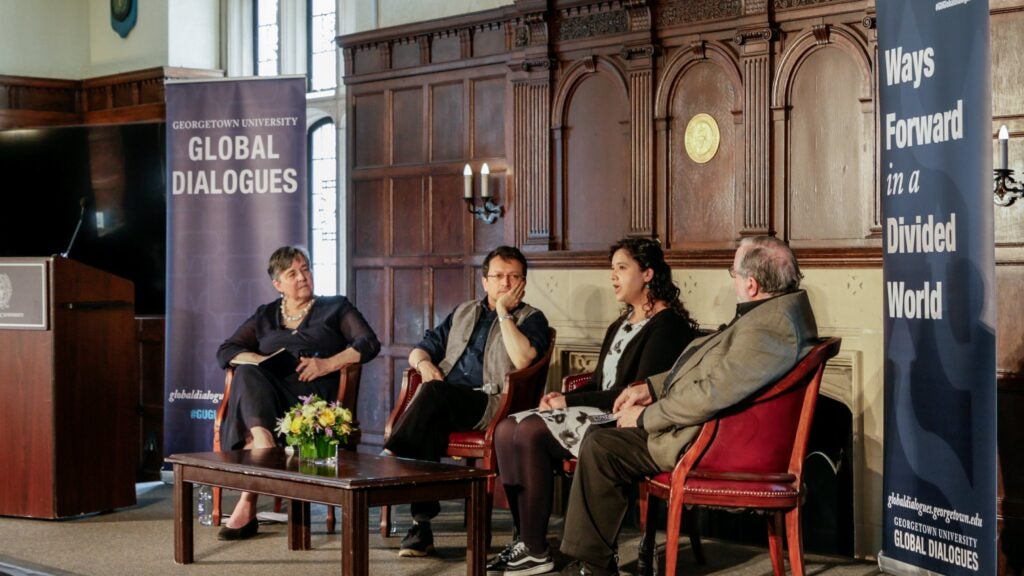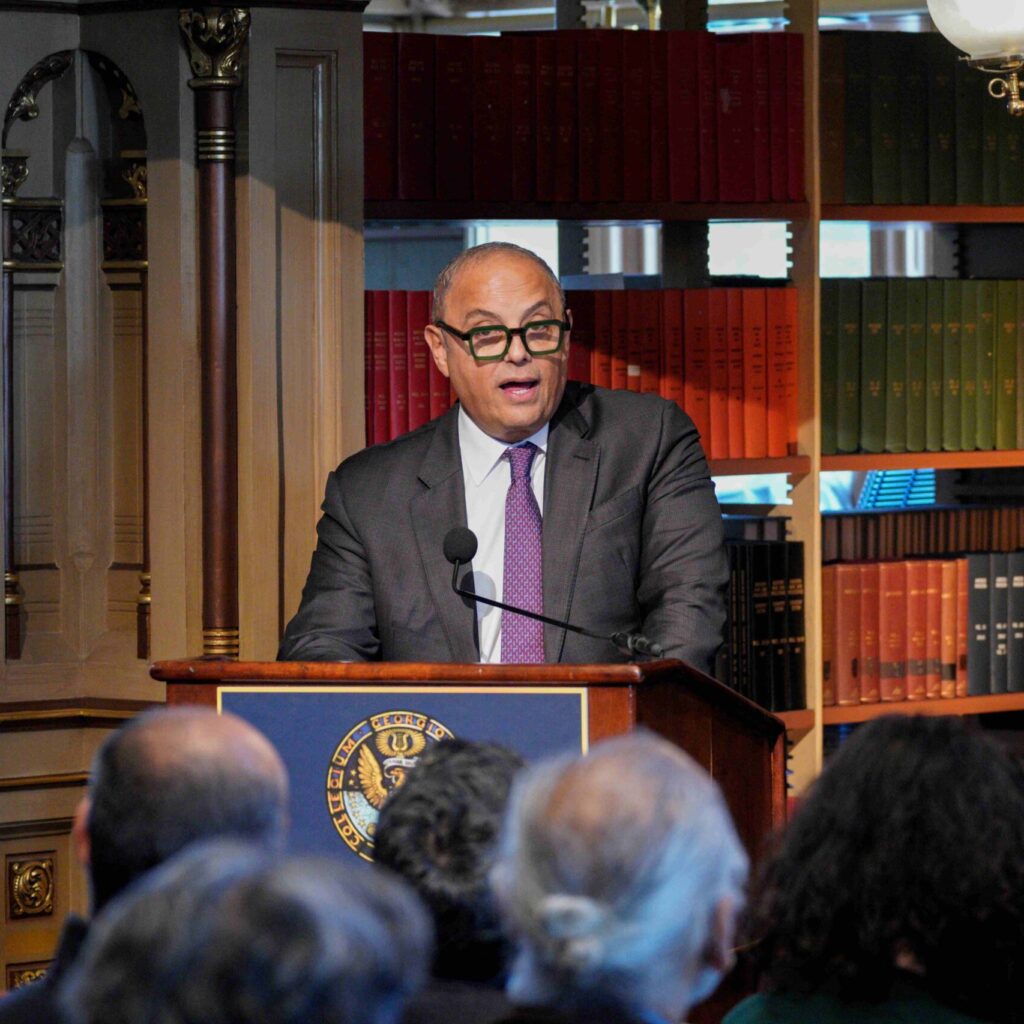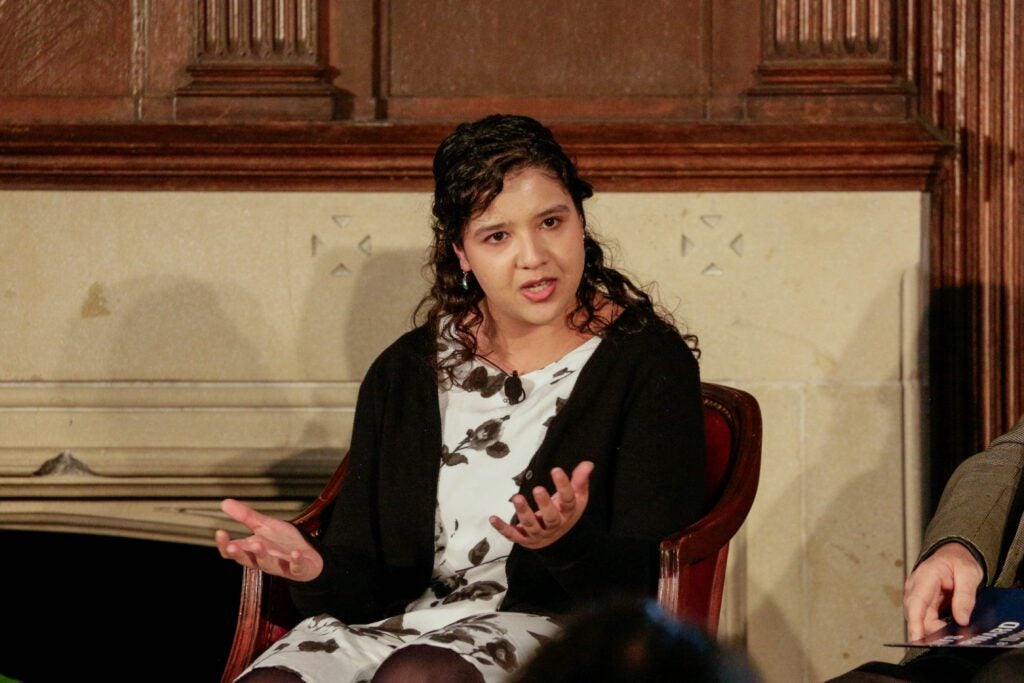GU-Q Joins Global South Intellectuals in Georgetown Global Dialogues

In a divided world in which more global dialogue is needed, less of it is taking place—a dangerous, untenable situation. During the week of April 22-26, 2024, Georgetown University hosted leading intellectuals from the Global South on campus to engage with each other, with prominent U.S.-based thinkers, and with students, faculty, and a wider public in a series of global dialogues designed to generate a multi sided, international conversation about the challenges facing global humanity.
Georgetown University in Qatar (GU-Q) was a key contributor to this initiative organized by Georgetown University’s Berkley Center for Religion, Peace, and World Affairs in cooperation with the Walsh School of Foreign Service, the College of Arts & Sciences, and the McDonough School of Business.
Dean Masri Introduces Panel Discussions
Dean Safwan Masri introduced the panels “Fostering Global Solidarities,” and “Cold War 2.0? The View from The Rest of the World” with a reflection on the need for global dialogue.
“The divisions we are witnessing globally are more pronounced and disconcerting than at any period in my lifetime,” he noted. Highlighting the role of universities, Dean Masri emphasized, “The peaceful, equitable world for which we yearn won’t become a reality unless and until we embrace a new framework for engagement and discussion.”

Student Expertise on Reviving Cosmopolitanism Panel
During the panel titled “Reviving Cosmopolitanism through a Cultural and Spiritual Turn,” Asma Shakeel (GU-Q’24) shared her insights on the historical and contemporary significance of cosmopolitanism. Reflecting on its roots, the Rhodes Scholar who conducted her Honors research on Kashmir stated, “I think the highest forms of cosmopolitan cultures can be viewed in the high age of imperialism, from the 15th century up until the 19th century. If you think about cosmopolitanism as a form that emerges out of vast engagement of ideas, goods, trades, then we cannot ignore the fact that driving the steamship was empire.”

She also highlighted the complexities of cosmopolitanism and resistance, noting, “There were a lot of resistance movements which had a sense of shared history and connection across what is known as the other world, the other that the West talks about.” Concluding her remarks, Asma critiqued the notion of cultural clashes, stating, “We have never been in a clash with one another. There have been wars, very bloody wars so to speak. And of course, there are tensions—but none have been cultural.”
Reflecting on the Purpose of the Dialogue: Why GGD?
Georgetown University students and scholars reflected on an essay by Thomas Banchoff and Pankaj Mishra on the purpose and importance of fostering dialogue. Two GU-Q community members chimed in to the conversation, offering their own takes on why the GGD is important.
Why Global Dialogue Matters: The View from Doha
In this reflection piece, Dean Safwan Masri touches on the importance of fostering global conversations.
“Worldwide, positive change can, and does, occur daily. Progress can be sweeping or incremental at the international, national, and local levels,” says Dean Masri, emphasizing that this progress is largely driven by a new generation of young leaders eager to disrupt the status quo. He adds, “Regardless of where, when, and how it manifests, much of it is being ushered in and propelled by a new generation of young leaders keen to disrupt the status quo.”
Universities as a Platform for Productive Dialogue
Renee Vongai Mutare (GU-Q’24) draws from her experience at GU-Q to offer advice on creating environments where diversity thrives.
She asserts, “Gone are the days when cultural, philosophical, and spiritual traditions remained isolated; instead, we must actively create environments where diversity not only exists but flourishes.” Mutare emphasizes that dialogue, which “doesn’t entail surrendering to others’ demands, but rather involves a commitment to mutual understanding,” is essential for mutual understanding and coexistence.
Reflections on Cosmopolitanism, Degrowth, and Global Identity
Other GU-Q students responded to the dialogue, drawing from personal experience and research to offer their own perspectives.
Confronting Capitalism’s Contradictions: A Meditation on Saito’s Degrowth Imperative
Brian Cody Wibowo (SFS’25) delves into Kohei Saito’s analysis of degrowth, critiquing capitalism’s inefficiencies. “The hegemony of growth is deeply entrenched not only in the circuits of capital and the corridors of power, but in the subjectivities and aspirations of citizens,” he emphasizes. Brian highlights the need for cultural change and a carefully managed, equitable transition.
Socialism with Saito Characteristics: Reflections on Kohei Saito’s Degrowth Marxism
Dung Tran (SFS’26) explores Kohei Saito’s vision of degrowth as an alternative to capitalism’s destruction. Tran notes, “His main quibble is with GDP as a reductionist measure of wellness and how the elites control all the resources.” Dung examines the challenges and potential solutions for implementing degrowth, particularly for the Global South.
Uncovering Utopian Unity: Ranjit Hoskote’s Exploration of Global Identity and Solidarity
Meerna Yamut (SFS’2024) discusses Ranjit Hoskote’s call for a cosmopolitanism that embraces diversity and respect. “Hoskote condemns cultural exclusivity and superiority, driving us to accept and delve into the plurality of the world,” she highlights. Mirna emphasizes the need for transnational unions to uplift marginalized voices and foster global solidarity.
Student Workshop on Ecological Belonging and the Climate Crisis
The global energy transition is proceeding slowly. The December 2023 COP28 meeting in Dubai repeated the familiar pattern—idealistic rhetoric without the ambitious, practical steps needed to address the climate crisis. This idea was central to the workshop, which featured a panel discussion and breakout groups focused on practical ways young people can drive positive change. GU-Q students Amira Zhanat, Aras Karlidag, John Carlos Burog, Mohammed Usrof, Pragati Singh, Rania Harrara, and Suhrob Karimov participated, exploring how they can effect positive change in their communities.